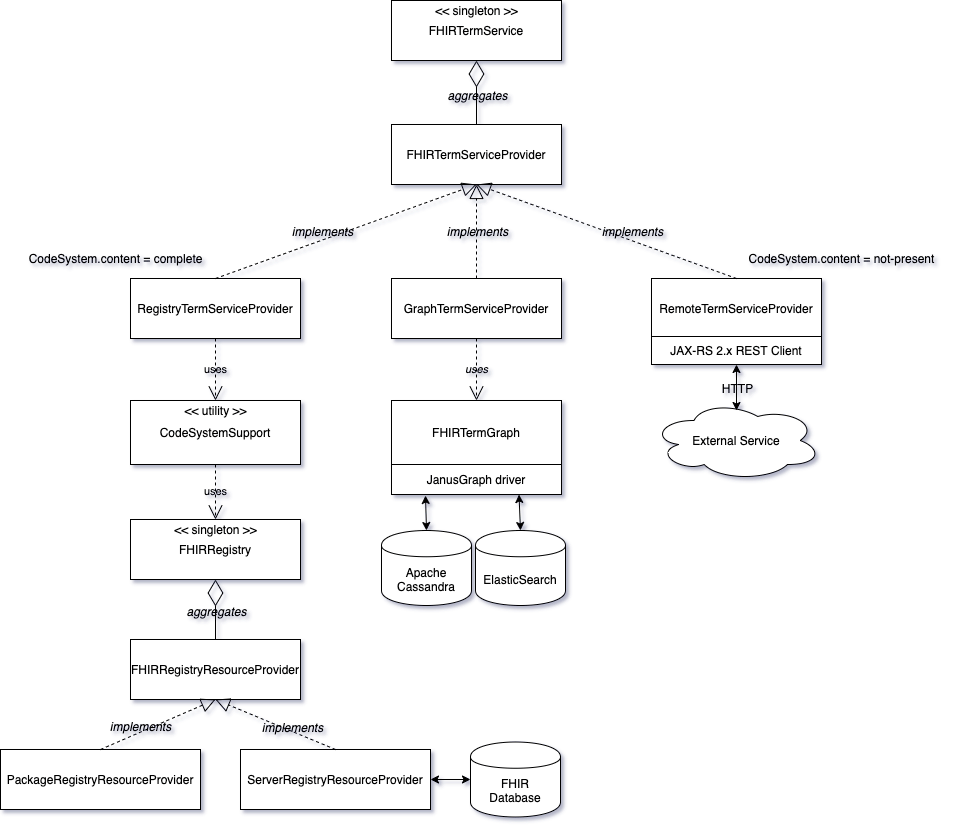FHIR Terminology Guide
Overview
The LinuxForHealth FHIR Server Terminology module (fhir-term) provides a FHIR terminology service provider interface (SPI) and a default implementation that implements terminology services using CodeSystem, ValueSet, and ConceptMap resources that have been made available through the FHIR registry module (fhir-registry).
FHIR Terminology Service Diagram

FHIR Terminology Service Provider Interface (SPI)
The FHIR Terminology Service Provider interface provides a mechanism for implementers to provide terminology capabilities via the Java ServiceLoader. The interface includes method signatures for closure, getConcept, getConcepts, hasConcept, hasConcepts, isSupported and subsumes:
public interface FHIRTermServiceProvider {Set<Concept> closure(CodeSystem codeSystem, Code code);Map<Code, Set<Concept>> closure(CodeSystem codeSystem, Set<Code> codes);Concept getConcept(CodeSystem codeSystem, Code code);Set<Concept> getConcepts(CodeSystem codeSystem);<R> Set<R> getConcepts(CodeSystem codeSystem, Function<Concept, ? extends R> function);Set<Concept> getConcepts(CodeSystem codeSystem, List<Filter> filters);<R> Set<R> getConcepts(CodeSystem codeSystem, List<Filter> filters, Function<Concept, ? extends R> function);boolean hasConcept(CodeSystem codeSystem, Code code);
NOTE: closure(CodeSystem, Set), getConcepts(CodeSystem, Function), getConcepts(CodeSystem, List, Function) and hasConcepts(CodeSystem, Set) all have default implementations in the FHIRTermServiceProvider interface.
Registry Terminology Service Provider Implementation
The default implementation of FHIRTermServiceProvider (RegistryTermServiceProvider) leverages terminology resources (CodeSystem, ValueSet, and ConceptMap) that have been made available through the FHIR registry module (fhir-registry). It supports CodeSystem resources with complete content (CodeSystem.content = 'complete') and ValueSet resources that reference CodeSystem resources that have complete content.
FHIR Terminology Service Singleton Facade
The FHIR Terminology Service Singleton facade (FHIRTermService) loads a list of FHIRTermServiceProvider instances from the ServiceLoader and includes an instance of the RegistryTermServiceProvider. Client code (Java) that requires terminology capabilities should access them via the FHIRTermService singleton facade. Here is an example:
ValueSet valueSet = ValueSetSupport.getValueSet("http://example.com/fhir/ValueSet/vs1");Coding coding = Coding.builder().system(Uri.of("http://example.com/fhir/CodeSystem/cs1")).version(string("1.0.0")).code(Code.of("a").display(string("concept a").build();ValidationOutcome outcome = FHIRTermService.getInstance().validateCode(valueSet, coding);
The expand , lookup, validateCode (CodeSystem), validateCode (ValueSet), and translate methods support the passing of optional parameters (e.g. ExpansionParameters, LookupParameters, etc.). Many of the methods also return an “outcome” object. These “parameter” and “outcome” objects are modeled after the input/output parameters specified in the terminology operations from the FHIR Terminology module: http://hl7.org/fhir/terminology-module.html.
The “parameter” objects can be created from a Parameters resource:
Parameters parameters = ...;ExpansionParameters expansionParameters = ExpansionParameters.from(parameters);
The “outcome” objects can be converted to a Parameters resource:
LookupOutcome outcome = ...;Parameters parameters = outcome.toParameters();
NOTE: The current implementation of FHIRTermService does not support optional parameters (e.g. ExpansionParameters, TranslationParameters, ValidationParameters, etc.).
FHIR Server Terminology Extended Operations
The FHIR terminology operations module (fhir-operation-term) connects the FHIR Server REST layer to the FHIR terminology module via the operations framework. This module implements the terminology operations as defined in the FHIR terminology service specification http://hl7.org/fhir/terminology-service.html. One exception is the $closure operation. The $closure operation is experimental and does not support versioning or replay. This means that the $closure operation will always return the set of closure table entries for the given input concepts and does not store client state.
FHIRPath Terminology Functions
The FHIRPath module (fhir-path) has been updated to support implementations of the draft FHIRPath terminology function specification: http://hl7.org/fhir/fhirpath.html#txapi. Support for the following functions (accessed through the %terminologies constant) has been implemented:
%terminologies.expand(valueSet, params) : ValueSet%terminologies.lookup(coded, params) : Parameters%terminologies.validateVS(valueSet, coded, params) : Parameters%terminologies.validateCS(codeSystem, coded, params) : Parameters%terminologies.subsumes(system, coded1, coded2, params) : code%terminologies.translate(conceptMap, code, params) : Parameters
Here is the same example from above but going through the FHIRPath evaluator:
Coding coding = Coding.builder().system(Uri.of("http://example.com/fhir/CodeSystem/cs1")).version(string("1.0.0")).code(Code.of("a").display(string("concept a").build();Collection<FHIRPathNode> initialContext = singleton(FHIRPathElementNode.elementNode(coding));FHIRPathEvaluator evaluator = FHIRPathEvaluator.evaluator();Collection<FHIRPathNode> result = evaluator.evaluate("%terminologies.validateCode('http://example.com/fhir/ValueSet/vs1', %context)");
Additionally, the FHIRPath functions subsumedBy and subsumes have been implemented per: http://hl7.org/fhir/fhirpath.html#functions
Graph Terminology Service Provider Implementation (experimental)
The FHIR term graph module fhir-term-graph provides an implementation of FHIRTermServiceProvider that is backed by a graph database (JanusGraph). The module also contains term graph loaders for SNOMED-CT Release Format 2 (RF2) files (SnomedTermGraphLoader), UMLS Rich Release Format (RRF) files (UMLSTermGraphLoader), and FHIR CodeSystem resources (CodeSystemTermGraphLoader). Graph term service providers may be enabled / configured through the fhir-server-config.json file per the configuration properties specified in the FHIR Server User’s Guide.
Example configurations:
"graphTermServiceProviders": [{"__comment": "Configuration for Berkeley DB Java Edition + Lucene","enabled": false,"configuration": {"storage.backend": "berkeleyje","storage.directory": "data/graph","index.search.backend": "lucene","index.search.hostname": "data/searchindex","storage.read-only": true,
Remote Terminology Service Provider Implementation (experimental)
The FHIR term remote module fhir-term-remote provides an implementation of FHIRTermServiceProvider that connects to an external service using a REST client to access code system content. The external service must implement the FHIR REST terminology APIs documented here. Remote term service providers may be enabled / configured through the fhir-server-config.json file per the configuration properties specified in the FHIR Server User’s Guide.
Example configurations:
"remoteTermServiceProviders": [{"__comment": "Configuration for public SNOMED-CT endpoint","enabled": true,"base": "https://snowstorm-fhir.snomedtools.org/fhir","supports": [{"system": "http://snomed.info/sct"}]},{"__comment": "Configuration for public LOINC endpoint",